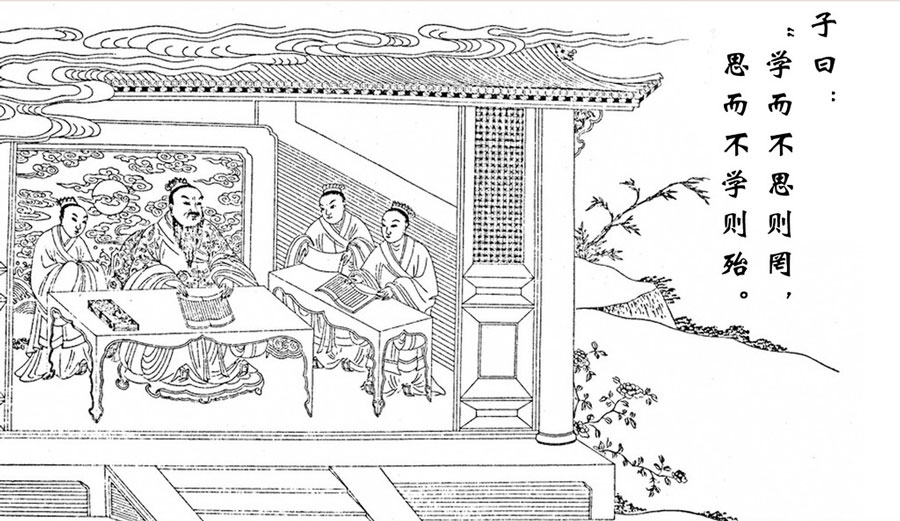Last week we finished the discussion on the general image of a proper Confucius/Superior Man. This week we start the discussion on the topic of study. Study leads to knowledge. The world “knowledge” in Chinese, consists of two components: Learn (学)and Ask (问). Learn implies acquiring, while ask includes thinking and inquiring. These 2 components are considered essentials in learning wisdom and truth, and often represent the theme of a student/scholar/teacher in his/her entire lifetime. Study, and its related topics, will be the theme of our discussion in the following few weeks.
2.9 Learn (acquire) and think
子曰、學而不思則罔、思而不學則殆。
The Master said, ‘Learning without thinking is labour lost; thinking without learning is dangerous.’
-> Learning without thinking is like a recording information without knowing what it is, whether it is true or not, and how it can be used, therefore provide no meaning and represent labour lost.
-> Thinking without learning (proper study, research, validation), is dangerous because when we run into questionable and possible negative information and people, thinking alone in them could lead us to confusion and destructive patterns, e.g. following question teachings/practices of a cult. Learning widely and broadly (e.g. the classics of the Confucius/Daoist/Buddhist schools), therefore, could be useful in comparing and validating information presented.
5.1 Learning and asking question.
子曰、敏而好學、不恥下問。
The Master said, ‘Learn diligently, not ashamed to ask question, even from inferiors (people with lower social rank/status).’
-> No human could be number one in every area, to upgrade ourselves and to understand the world, we need to find teachers who are more advanced than ourselves in respective areas to learn (and think). When need clarification or advice, overcome our laziness, pride, and fear to ask question when needed. This is good student.
* * *
Great masters from Confucius, Daoist, and Buddhist traditions are mostly also well-learnt scholars. This is a Chinese saying in the Daoist tradition: “未有神仙不读书” (no immortal had succeeded without study). This suggests the importance of study in personal and spiritual development.上周我们完成了对儒家君子整体要求的讨论。这个星期,我们开始讨论孔子如何研究学问。 学问一词,由两部分组成:学习的“学”,和发问的“问”。 学指收集,而问指思考和探究。 这两个部分都是学习智慧和真理的重要部分,并经常是认真学者的一生探求。 我们将于以下几个星期,集中讨论孔子如何跟他的学生讲学问,以及其相关主题。
2.9 學而不思則罔
子曰、學而不思則罔、思而不學則殆。
– >学而不思只是记录信息,不知道它是什么,是真还是假,和它如何被使用,因此没有任何意义,白忙活而不知所以然(罔)。
– >思而不学(学习,研究,和验证)是危险的,因为当我们遇到负面的人或信息时,盲目的思考可能会导致思想混乱,以致产生负面的行为,例如盲从邪教的教导和做法。 因此,广泛的学习(例如:儒道释的经典),可帮助我们比较和分辨生活中的人和信息。
5.1 不恥下問
子曰、敏而好學、不恥下問。
– >没有人能在每一个领域成为第一。 所以,为了提升自己和了解世界,我们需要在各自的领域找比我们更好的老教来学习。 当我们有疑问,或者是需要建议时,要克服我们的懒惰,自大,和不好意思去发问,不耻下问。
* * *
远看历史,我们会发现最伟大的儒家,道家和佛家大师,都是博学精深的学者。道家有个说法:“未有神仙不读书”,这表明了学问对个人以及精神修炼的重要性。


Leave a Reply